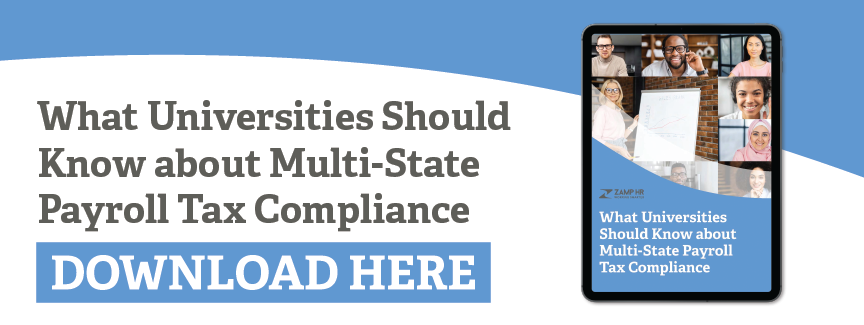In general, when a university staff member or a faculty member moves their residence, the move has no impact on the HR staff's payroll processing duties. The one exception to that rule sets off when the employee moves across state lines from the university or moves to a different local jurisdiction within the same state as the university. If the university's location and the employee's new home are in two other states, the multi-state payroll tax withholding rules are triggered. And that is true even if the new residence and the university are a mere mile apart.
The following are the result of such a move:
Register for a New State Tax ID
When the university has an employee who moves to reside in another state, the new state's laws may require a unique state tax identification number. This happens because the state may require the university to pay the tax obligations to the new state. Employers need the new state's tax identification number in order to pay those taxes. If the university does not approach this properly, then penalties and interest may apply to unpaid tax obligations.
A New Tax Nexus Is Formed
States have the power to require that companies that have a tax nexus with that state pay various state payroll taxes. Universities with a state tax nexus must withhold state income tax, paid family and medical leave where required, and temporary disability payments from their employee's wages in those states that require such deductions. Withholding requirements vary from state to state, and the university HR staff must keep up with the latest changes in each state's laws that impact their employees.
A tax nexus means that the state considers the university to have a connection or a presence within a particular state. Employees may create such a nexus if their work in that state exceeds the state's minimum threshold for days worked or dollars earned. A university with a nexus to a particular state must withhold state income taxes from its employees' wages. New York State, for example, requires income tax withholding for employees who work in the state for 14 days a year.
For employees who split their time between different states, the HR payroll duties include allocating the number of workers' wages to each relevant state and then withholding income tax according to that allocation.
New Compliance Requirements
A university may have HR compliance duties with respect to various state employment laws when employees live and work in different states. For example, the university may have to comply with laws related to:
- How often employees must receive their pay;
- Minimum wage laws for the relevant states; and
- Whether the state requires deductions for the state's programs.
These state withholding requirements vary by state. Therefore, HR staff must remain mindful of each state's employment laws that impact the withholding obligations for that university.
New Unemployment Taxes
In most states, the employee's change in residence will mean the university has to pay the new state's unemployment tax. This tax is referred to as SUTA. For most states, SUTA is an employer-paid tax. Some states, however, impose a SUTA tax on employees. In those cases, the university must withhold the tax from the employees' wages and then send the SUTA taxes to the state. A university with employees residing in states such as Alaska, New Jersey, or Pennsylvania must withhold SUTA from those employees' wages.
Reciprocity Agreements Triggered
In states where residents are dual-state employees of the university, the relevant states may have reciprocity agreements with one or more states. A reciprocity agreement aims to avoid double taxation on employee wages. So, reciprocity agreements simplify tax administration where employees have dual-state responsibility.
A reciprocity agreement means that the states agree that only one state will impose income tax withholding for their residents. The agreements mean that employers only report wages and withhold income taxes for the state of residence. A few examples of reciprocity agreements between states are:
- Maryland and District of Columbia;
- Virginia and District of Columbia; and
- Arizona and California.
Not all states have reciprocity agreements, so it becomes HR's responsibility to understand and follow the state's appropriate agreements for dual-state employees.
File Non-Resident Tax Returns
In states without a reciprocal agreement, some states allow a credit on their resident's taxes for the taxes paid to the non-resident state. This is another method to avoid double taxation on the state's residents. It does not always work perfectly. If the amount of the non-resident state's taxes exceeds the allowable tax credit, the employees will see an increase in the taxes they owe.
Preparation is Key to Compliance
When a university staff or faculty member moves to reside in another state but continues working for the university, tax implications arise, and payroll withholding becomes more complex. These changes may include imposing state income tax withholding for both states, unemployment taxes, and compliance with new employment laws related to minimum wages and frequency of wage payments.
The research required to comply with local and state rules and regulations and keep up with regular modifications to those laws may become a large burden on university HR staff.
If multi-state tax withholding responsibilities take up too much of HR staff time, the university should consider hiring a Professional Employer Organization (PEO) as its HR outsourcing partner. The PEO shifts some responsibility from the university's shoulders to the PEO while it frees up precious HR staff time.



